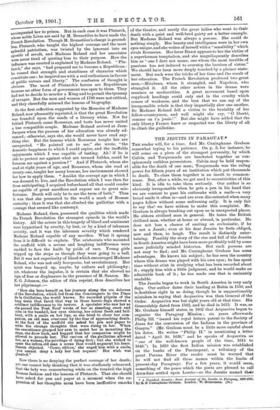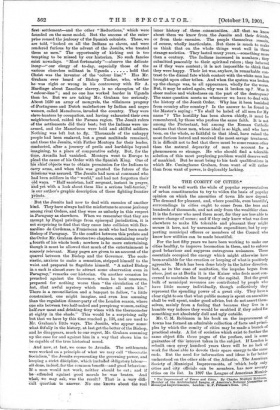THE JESUITS IN PARAGUAY.*
THE reader will, for a time, find Mr. Cuninghame Graham somewhat trying to his patience. On p. 3, for instance, he will come on a piece of the strangest perversity, by which Calvin and Torquemada are bracketed together as con- spicuously ruthless persecutors. Calvin may be held respon- sible for the death of one man; Torquemada was the ruling power for fifteen years of an institution which put thousands to death. To class them together is an insult to common- sense. But, after a while, we get used to eccentricities of this kind. It is idle to take them seriously. Our author is so obviously irresponsible when he gets a pen in his hand that we are content to pass his outbreaks with a smile—a very broad smile it often is—and are even discontented when many pages follow without some enlivening sally. It is only fair to say the we have seldom to make this complaint. Mr. Graham is always breaking out upon us in unexpected places. He abhors civilised man in general. He hates the British civilised man, whether at home or abroad, in particular. He does not lose a chance of smiting an ecclesiastic, if he is not a Jesuit; even at his dear Jesuits he feels obliged, now and then, to laugh. The result is distinctly enter- taining. Possibly the story of the rise and fall of the Jesuits in South America might have been more profitably told by some more judicially minded historian. But such persons are not easy to find; and Mr. Cuninghame Graham has some advantages. He knows his subject ; he has seen the country where this drama was played with his own eyes; he has spent time without stint in studying what has been recorded about it ; supply him with a little judgment, and he would make an admirable book of it ; he has made one that is eminently readable.
The Jesuits began to work in South America in very early days. Our author dates their landing at Bahia in 1550, and is doubtless right in so doing, though he is unquestionably mistaken in saying that Acquaviva was then General of the Order. Acquaviva was but eight years old at that time. His Generalship dated from 1582, and he died in 1613. It was, as Mr. Graham himself states, in 1602 that Acquaviva began to organise the Paraguay Mission ; six years afterwards Philip III. "issued his royal letters patent to the Society of Jesus for the conversion of the Indians in the province of Guayra." (Mr. Graham must be a little more careful about his dates. He writes "Philip IL" in mentioning a letter dated "April 30, 1639," and he speaks of Acquaviva as "one of the well-known people of the time, 1615 to 1648.") In 1610 the first Indian mission was established on the banks of the Paranapane, a tributary of the great Parana River (the reader must be warned that he will not find all these names within the limits of present-day Paraguay). For a few years, it would seem, something of the peace which the poets are pleased to call Area dian settled upon Loreto—so the Jesuits named their • A Vanished Arcadia: Some Account of the Jesuits in Paraguay, 1004767. By B. B. Cuningimme Graham. London ; W. Heinemann. 05.1
first settlement—and the other "Reductions," which. were founded on the same model. But the success of the enter- prise roused the jealousy of the Spanish colonists. These, we are told, 'looked on all the Indians as slaves, and were rendered furious by the advent of the Jesuits, who treated them as men." The opportunity of kicking out is too tempting to be missed by our historian. No such fancies exist nowadays. "Most fortunately "—observe the delicate irony—" our clergy of to-day, especially those of the various churches militant in Uganda hold that Christ was the inventor of the colour line." Has Mr. Graham ever heard of Bishop Tucker, who, whether he was right or wrong in his controversy with Sir A. Hardinge about Zanzibar slavery, is no champion of the " oolour-line " ; and no one has worked harder in Uganda than he. But we are taking Mr. Graham too seriously. About 1630 an army of mongrels, the . villainous progeny of Portuguese and Dutch malefactors by Indian and negro women, called Mamelucos, invaded the country. They were slave-hunters by occupation, and having exhausted their own neighbourhood, raided the Parana region. The Jesuit rulers of the settlements did their best; but the Indians were un- armed, and the Mamelucos were bold and skilful soldiers.
Nothing was left Thousands of the unhappy people had been enslaved, but a great multitude remained, and these the Jesuits, with Father Montoya for their leader, conducted, after a journey of perils and hardships beyond imagining, to a place of comparative safety. But, for the time, Arcadia had vanished. Montoya went to Europe to plead the cause of his Order with the Spanish King. One of his chief objects was to obtain permission for the Indians to carry arms, and when this was granted the future of the Missions was assured. The Jesuits had men at command who had been soldiers in the "world," and had not forgotten their old ways. " Half sacristan, half sergeant, instant in prayer, and yet with a look about them like a serious bull-terrier," is our author's graphic description of these fighting frontier But the Jesuits had now to deal with enemies of another kind. They have always had the misfortune to arouse jealousy among rival Orders, and they were as unlucky in this respect in Paraguay as elsewhere. When we remember that they are exempt by Papal privilege from. episcopal jurisdiction, it is not surprising to find that they came into collision with Ber- nardino de Cardenas, a Franciscan monk who had been made Bishop of Paraguay. To the conflict between this prelate and the Order Mr. Graham devotes two chapters, containing nearly a fourth of his whole book; nowhere is he more entertaining, though it must be allowed that much of the entertainment is scarcely relevant. Many pages are given to an account of the quarrel between the Bishop and the Governor. The eccle- siastic, anxious to make a sensation, stripped himself to the waist and. prepared to flagellate himself. A naked Bishop in a sack is almost sure -to attract some observation even in Paraguay," remarks our historian. On another occasion he preached against the Governor, whom he took unawares, prepared for nothing worse than "the circulation of the hat,, that awful mystery which makes all sects kin." There is a reconciliation and a banquet to follow, "a little constrained, one might imagine, and. ,even less amusing than the regulation dinner-party of the London season, where one sits between two half-naked and perspiring women, eating half-raw meat and drinking fiery wines with the thermometer at eighty in the shade." This would be a surprising sally but that we have by this time reached p. 138, and are used to Mr. Graham's little ways. The Jesuits, who appear some- what fitfully in the history, at last get the better of the Bishop, and he disappears, much to our regret, Mr. Graham summing up the case for and against him in a way that shows him to be capable of the true historical mood.
And now, at last, we come to Arcadia. The settlements were -worked on a principle of what we may call "theocratic Socialism," the Jesuits representing the governing.power, and keeping a strict didcipline, which inelu4ed obligatory labour—
all done, indeed, for the Common benefit—and good behaviour.
If a man would not work, neither should he eat ; and if 'he offended against good morals he was beaten. And *hat, we may ask, was the result? That is a very diffi- cult ' question to answer. No one knows about the real inner history of these communities. All that we know about them we know from the Jesuits and their friends, or from their enemies. The people themselves remain, of course, wholly inarticulate. But there is much to make us think that on the whole things went well in these strange societies. - They lasted many years,—soraething more than a century. The Indians increased in numbers ; they submitted peaceably to their spiritual rulers ; they behaved as if they were content ; it is not impossible to think that they were happy. Their lot was, anyhow, in remarkable con. trast to the dismal fate which contact with the white man has brought upon other tribes. And when the system was broken up the change was, to all appearance, wholly for the worse. But, it may be asked again, why was it broken up ? Was it sheer malice and wickedness on the part of the destroyers ? The same question meets us whenever we have to deal with the history of the Jesuit Order. ' Why has it been banished from country after country ? Is the answer to be found hi the Master's saying : "Ye shall be hated of all men for My name " ? The hostility has been shown chiefly, it must be remembered, by those who profess the same faith. It' is not among the Protestant, but among the Roman Catholic nations that these men, whose ideal is so high, and who have been, on the whole, so faithful to that ideal, have raised the most furious hatred and received the most savage treatment. It is difficult not to feel that there must be some reason other than the natural, depravity of man to account for a phenomenon so strange. He who should find a tolerable solution of this most perplexing problem would deserve well of mankind. But he must bring to his task qualifications in which Mr. Cuninghame Graham., from want of will rather than from want of power, is deplorably lacking.















































 Previous page
Previous page